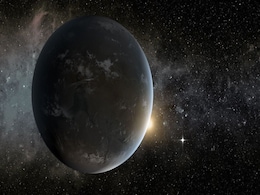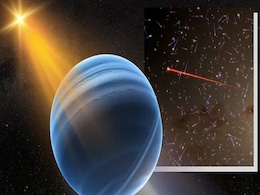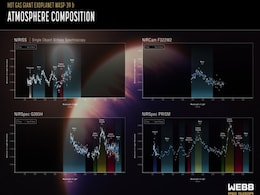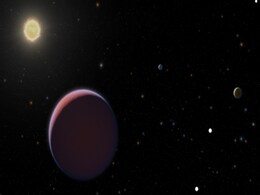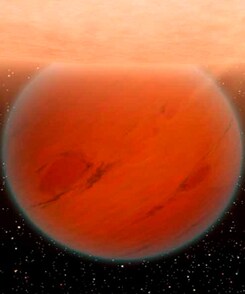Exoplanets Discovery
- All
- News
- Videos
- Web Stories
-

Signs of Alien Life Detected on Nearby Exoplanet Using NASA’s James Webb Space Telescope
- Friday April 18, 2025
- Written by Gadgets 360 Staff
Astronomers have detected possible biosignature gases, including dimethyl sulfide (DMS), in the atmosphere of exoplanet K2-18b using NASA’s James Webb Space Telescope. Located in the habitable zone, this “Hycean” world may host a vast ocean and a hydrogen-rich atmosphere, raising intriguing possibilities about alien life. Further research is ...
-
 www.gadgets360.com
www.gadgets360.com
-

Scientists Discover New Sub-Neptune Exoplanet Using Radial Velocity Detection Technique
- Tuesday April 15, 2025
- Written by Gadgets 360 Staff
A team of international astronomers has identified a new sub-Neptune exoplanet that has been orbiting the star called GI 410. This has been a magnificent discovery in the area of science. This newly detected sub-Neptune exoplanet weighs approximately 8.5 Earth masses. The discovery was commenced by the use of the Radial Method, the technique that h...
-
 www.gadgets360.com
www.gadgets360.com
-

Astronomers Detect Methane in the Atmosphere of the Nearest T Dwarf Star to Earth
- Saturday April 12, 2025
- Written by Gadgets 360 Staff
Astronomers have detected methane in the nearest known T dwarf, offering new insight into its atmospheric composition. The study further highlights that the carbon abundance in the planet is estimated to be -1.5 dex, while the effective temperature could be around 1,000 K. The author of the paper further revealed that the low metallicity of the T ...
-
 www.gadgets360.com
www.gadgets360.com
-

Two New Exoplanets Found Orbiting a Star in Draco Constellation
- Wednesday April 2, 2025
- Written by Gadgets 360 Staff
Astronomers have identified two exoplanets, TOI-1453 b and TOI-1453 c, orbiting a star 250 light-years away in Draco. The planets, a super-Earth and a sub-Neptune, were detected using NASA’s TESS satellite and the HARPS-N spectrograph. TOI-1453 b is a rocky planet orbiting close to its star, while TOI-1453 c is twice Earth’s size and may have a...
-
 www.gadgets360.com
www.gadgets360.com
-

Scientists Observe Rare Plastic Ice, A Hybrid Form of Ice and Water, Under Extreme Pressure and Heat
- Thursday February 20, 2025
- Written by Gadgets 360 Staff
Researchers have observed plastic ice, a phase where water molecules rotate while staying in a solid structure. The discovery, made under extreme pressure and heat, could provide new insights into the composition of icy exoplanets and moons. The findings suggest plastic ice VII may have existed in Europa and Titan's interiors and could influence nu...
-
 www.gadgets360.com
www.gadgets360.com
-

A Neptune-Like Exoplanet Is Racing Through Space at Record Speed
- Monday February 17, 2025
- Written by Gadgets 360 Staff
Scientists have detected an exoplanet racing through space at 1.2 million mph, making it the fastest known planet. The Neptune-sized world orbits a hypervelocity star, first hinted at in 2011 via gravitational microlensing. Astronomers, using Keck Observatory and Gaia data, have confirmed the system’s extreme speed, suggesting it may even leave t...
-
 www.gadgets360.com
www.gadgets360.com
-

Astronomers Spot a High-Speed Star That May Carry a Planet With It
- Friday February 14, 2025
- Written by Gadgets 360 Staff
Astronomers have identified a celestial object moving through the Milky Way at over 1.2 million mph. Believed to be a small star with a possible massive exoplanet, the discovery could mark the fastest-known planetary system. If its speed exceeds 1.3 million mph, it may eventually escape the galaxy. Scientists are still verifying whether it is the s...
-
 www.gadgets360.com
www.gadgets360.com
-

A Star With a Planet May Be Racing Through the Galaxy at Record Speed
- Wednesday February 12, 2025
- Written by Gadgets 360 Staff
Astronomers have identified a potential record-breaking exoplanet system moving at 1.2 million mph. Detected through microlensing, the discovery suggests a low-mass star with an orbiting planet is racing through the Milky Way. Data from the Keck Observatory and ESA’s Gaia satellite indicate a high-speed celestial body that may eventually escape t...
-
 www.gadgets360.com
www.gadgets360.com
-

Newly Confirmed Super-Earth HD 20794 d May Support Life in Habitable Zone
- Tuesday February 11, 2025
- Written by Gadgets 360 Staff
A super-Earth, HD 20794 d, has been confirmed within a habitable zone 20 light years from Earth. The planet, first detected in 2022, has a mass six times that of Earth and orbits a sun-like star. Although its elliptical orbit affects temperature stability, its potential to sustain liquid water makes it a key target for upcoming space missions. Scie...
-
 www.gadgets360.com
www.gadgets360.com
-

NASA's TESS Discovers Fastest Disintegrating Planet Ever Seen: What You Need to Know
- Monday January 20, 2025
- Written by Gadgets 360 Staff
NASA’s TESS has observed the closest and fastest disintegrating planet, BD+05 4868 Ab, located 141 light-years away. The planet loses a moon’s mass every million years as it is bombarded by its host star. Scientists are examining its massive dust trails, offering rare insights into the composition of terrestrial exoplanets. Researchers from MIT...
-
 www.gadgets360.com
www.gadgets360.com
-

Astronomers Discover Water and Carbon Dioxide in WASP-166 b's Atmosphere
- Saturday January 11, 2025
- Written by Gadgets 360 Staff
Astronomers have detected water and carbon dioxide in the atmosphere of WASP-166 b, a hot super-Neptune exoplanet. Using data from the James Webb Space Telescope (JWST), the findings also noted ammonia in smaller quantities. WASP-166 b, located 368 light-years away, is a massive planet that orbits its star every 5.44 days, with a temperature of 1,2...
-
 www.gadgets360.com
www.gadgets360.com
-

New Study Challenges Planet Formation Models with PDS 70b’s Chemical Mystery
- Thursday December 19, 2024
- Written by Gadgets 360 Staff
A new study on PDS 70b, a forming exoplanet located 400 light-years away, reveals a significant mismatch between its atmospheric composition and the surrounding protoplanetary disk. This discovery casts doubt on existing planet formation models, suggesting that more research is needed to understand how planets gather materials and elements during t...
-
 www.gadgets360.com
www.gadgets360.com
-

Venus Never Had Oceans or Conditions to Support Life, New Study Finds
- Monday December 9, 2024
- Written by Gadgets 360 Staff
Scientists from the University of Cambridge have concluded that Venus likely never had oceans or conditions to support life. Their study, published in Nature Astronomy, analysed atmospheric chemistry and volcanic activity. They found that volcanic gases lacked significant steam, indicating the planet's interior has always been dry. This research ha...
-
 www.gadgets360.com
www.gadgets360.com
-

NASA's James Webb Space Telescope Discovers Fourth Planet in Kepler-51 System
- Wednesday December 4, 2024
- Written by Gadgets 360 Staff
A study published in The Astronomical Journal reveals the discovery of Kepler-51e, the fourth planet in the Kepler-51 system, led by Dr Jessica Libby-Roberts of Penn State and Dr Kento Masuda of Osaka University. Observations indicated that only a four-planet model could explain the transit timing variations. Kepler-51e’s orbit, just inside the s...
-
 www.gadgets360.com
www.gadgets360.com
-

Indian Scientists Discover A Massive Exoplanet That is Five Times Larger Than Earth
- Tuesday October 29, 2024
- Written by Gadgets 360 Staff
Indian scientists have identified a new exoplanet named TOI-6651b, which is five times larger than Earth and has a mass around 60 times greater. Located in the Neptunian desert, it orbits a Sun-like star every 5.06 days. The planet's composition suggests unique evolutionary processes, providing valuable insights into how such dense exoplanets form ...
-
 www.gadgets360.com
www.gadgets360.com
-

Signs of Alien Life Detected on Nearby Exoplanet Using NASA’s James Webb Space Telescope
- Friday April 18, 2025
- Written by Gadgets 360 Staff
Astronomers have detected possible biosignature gases, including dimethyl sulfide (DMS), in the atmosphere of exoplanet K2-18b using NASA’s James Webb Space Telescope. Located in the habitable zone, this “Hycean” world may host a vast ocean and a hydrogen-rich atmosphere, raising intriguing possibilities about alien life. Further research is ...
-
 www.gadgets360.com
www.gadgets360.com
-

Scientists Discover New Sub-Neptune Exoplanet Using Radial Velocity Detection Technique
- Tuesday April 15, 2025
- Written by Gadgets 360 Staff
A team of international astronomers has identified a new sub-Neptune exoplanet that has been orbiting the star called GI 410. This has been a magnificent discovery in the area of science. This newly detected sub-Neptune exoplanet weighs approximately 8.5 Earth masses. The discovery was commenced by the use of the Radial Method, the technique that h...
-
 www.gadgets360.com
www.gadgets360.com
-

Astronomers Detect Methane in the Atmosphere of the Nearest T Dwarf Star to Earth
- Saturday April 12, 2025
- Written by Gadgets 360 Staff
Astronomers have detected methane in the nearest known T dwarf, offering new insight into its atmospheric composition. The study further highlights that the carbon abundance in the planet is estimated to be -1.5 dex, while the effective temperature could be around 1,000 K. The author of the paper further revealed that the low metallicity of the T ...
-
 www.gadgets360.com
www.gadgets360.com
-

Two New Exoplanets Found Orbiting a Star in Draco Constellation
- Wednesday April 2, 2025
- Written by Gadgets 360 Staff
Astronomers have identified two exoplanets, TOI-1453 b and TOI-1453 c, orbiting a star 250 light-years away in Draco. The planets, a super-Earth and a sub-Neptune, were detected using NASA’s TESS satellite and the HARPS-N spectrograph. TOI-1453 b is a rocky planet orbiting close to its star, while TOI-1453 c is twice Earth’s size and may have a...
-
 www.gadgets360.com
www.gadgets360.com
-

Scientists Observe Rare Plastic Ice, A Hybrid Form of Ice and Water, Under Extreme Pressure and Heat
- Thursday February 20, 2025
- Written by Gadgets 360 Staff
Researchers have observed plastic ice, a phase where water molecules rotate while staying in a solid structure. The discovery, made under extreme pressure and heat, could provide new insights into the composition of icy exoplanets and moons. The findings suggest plastic ice VII may have existed in Europa and Titan's interiors and could influence nu...
-
 www.gadgets360.com
www.gadgets360.com
-

A Neptune-Like Exoplanet Is Racing Through Space at Record Speed
- Monday February 17, 2025
- Written by Gadgets 360 Staff
Scientists have detected an exoplanet racing through space at 1.2 million mph, making it the fastest known planet. The Neptune-sized world orbits a hypervelocity star, first hinted at in 2011 via gravitational microlensing. Astronomers, using Keck Observatory and Gaia data, have confirmed the system’s extreme speed, suggesting it may even leave t...
-
 www.gadgets360.com
www.gadgets360.com
-

Astronomers Spot a High-Speed Star That May Carry a Planet With It
- Friday February 14, 2025
- Written by Gadgets 360 Staff
Astronomers have identified a celestial object moving through the Milky Way at over 1.2 million mph. Believed to be a small star with a possible massive exoplanet, the discovery could mark the fastest-known planetary system. If its speed exceeds 1.3 million mph, it may eventually escape the galaxy. Scientists are still verifying whether it is the s...
-
 www.gadgets360.com
www.gadgets360.com
-

A Star With a Planet May Be Racing Through the Galaxy at Record Speed
- Wednesday February 12, 2025
- Written by Gadgets 360 Staff
Astronomers have identified a potential record-breaking exoplanet system moving at 1.2 million mph. Detected through microlensing, the discovery suggests a low-mass star with an orbiting planet is racing through the Milky Way. Data from the Keck Observatory and ESA’s Gaia satellite indicate a high-speed celestial body that may eventually escape t...
-
 www.gadgets360.com
www.gadgets360.com
-

Newly Confirmed Super-Earth HD 20794 d May Support Life in Habitable Zone
- Tuesday February 11, 2025
- Written by Gadgets 360 Staff
A super-Earth, HD 20794 d, has been confirmed within a habitable zone 20 light years from Earth. The planet, first detected in 2022, has a mass six times that of Earth and orbits a sun-like star. Although its elliptical orbit affects temperature stability, its potential to sustain liquid water makes it a key target for upcoming space missions. Scie...
-
 www.gadgets360.com
www.gadgets360.com
-

NASA's TESS Discovers Fastest Disintegrating Planet Ever Seen: What You Need to Know
- Monday January 20, 2025
- Written by Gadgets 360 Staff
NASA’s TESS has observed the closest and fastest disintegrating planet, BD+05 4868 Ab, located 141 light-years away. The planet loses a moon’s mass every million years as it is bombarded by its host star. Scientists are examining its massive dust trails, offering rare insights into the composition of terrestrial exoplanets. Researchers from MIT...
-
 www.gadgets360.com
www.gadgets360.com
-

Astronomers Discover Water and Carbon Dioxide in WASP-166 b's Atmosphere
- Saturday January 11, 2025
- Written by Gadgets 360 Staff
Astronomers have detected water and carbon dioxide in the atmosphere of WASP-166 b, a hot super-Neptune exoplanet. Using data from the James Webb Space Telescope (JWST), the findings also noted ammonia in smaller quantities. WASP-166 b, located 368 light-years away, is a massive planet that orbits its star every 5.44 days, with a temperature of 1,2...
-
 www.gadgets360.com
www.gadgets360.com
-

New Study Challenges Planet Formation Models with PDS 70b’s Chemical Mystery
- Thursday December 19, 2024
- Written by Gadgets 360 Staff
A new study on PDS 70b, a forming exoplanet located 400 light-years away, reveals a significant mismatch between its atmospheric composition and the surrounding protoplanetary disk. This discovery casts doubt on existing planet formation models, suggesting that more research is needed to understand how planets gather materials and elements during t...
-
 www.gadgets360.com
www.gadgets360.com
-

Venus Never Had Oceans or Conditions to Support Life, New Study Finds
- Monday December 9, 2024
- Written by Gadgets 360 Staff
Scientists from the University of Cambridge have concluded that Venus likely never had oceans or conditions to support life. Their study, published in Nature Astronomy, analysed atmospheric chemistry and volcanic activity. They found that volcanic gases lacked significant steam, indicating the planet's interior has always been dry. This research ha...
-
 www.gadgets360.com
www.gadgets360.com
-

NASA's James Webb Space Telescope Discovers Fourth Planet in Kepler-51 System
- Wednesday December 4, 2024
- Written by Gadgets 360 Staff
A study published in The Astronomical Journal reveals the discovery of Kepler-51e, the fourth planet in the Kepler-51 system, led by Dr Jessica Libby-Roberts of Penn State and Dr Kento Masuda of Osaka University. Observations indicated that only a four-planet model could explain the transit timing variations. Kepler-51e’s orbit, just inside the s...
-
 www.gadgets360.com
www.gadgets360.com
-

Indian Scientists Discover A Massive Exoplanet That is Five Times Larger Than Earth
- Tuesday October 29, 2024
- Written by Gadgets 360 Staff
Indian scientists have identified a new exoplanet named TOI-6651b, which is five times larger than Earth and has a mass around 60 times greater. Located in the Neptunian desert, it orbits a Sun-like star every 5.06 days. The planet's composition suggests unique evolutionary processes, providing valuable insights into how such dense exoplanets form ...
-
 www.gadgets360.com
www.gadgets360.com


